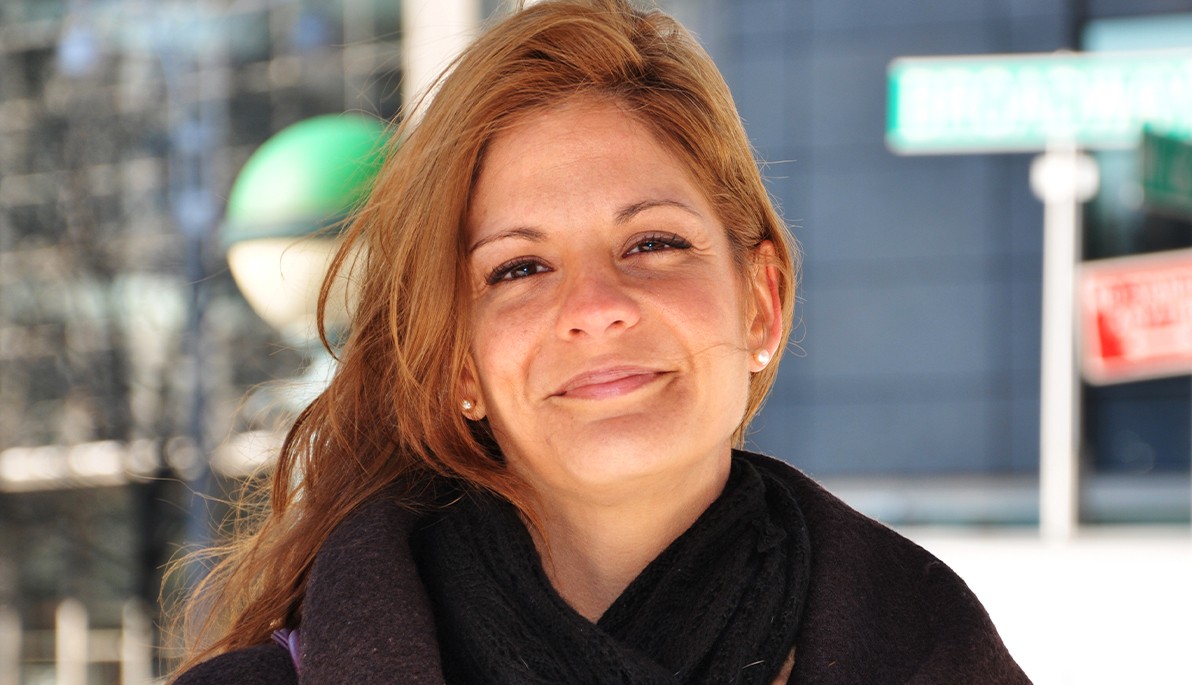
Staff Profile: Amy Bravo

Title: Senior Director
Department: Career Success and Experiential Education
Joined New York Tech: 2008
Campus: New York City
Bringing Communities Together
Since Amy Bravo joined New York Tech in 2008, she has helped develop multiple outreach and community programs that have benefited the university and local communities. Among those programs are the Internship Certificate Program, Service-learning Program, Alternative Break Program, Community Service Centers, and Consultants for the Public Good Program. She spoke to New York Tech News about her passion for learning and the positive role experiential learning plays in a student’s education.
Tell us a bit about your background and what drew you to higher education.
I am the third of four children, raised in a working-class household in Garfield, NJ. I am a first-generation college student and the only one of my siblings to attend a traditional university. I learned the value of hard work and integrity from both my parents, my passion and my humor from my dad, my logical thinking and resolve from my mom, and my compassion for others from my grandmother.
I always loved school. I performed well academically, so part of me always wanted to remain in a school setting. As I advanced through my studies, I was drawn to the social and behavioral sciences. I love learning about people, society, and culture. When I started learning about social issues like discrimination and homelessness, I became passionate about social justice work. I knew then that whatever I chose to do in my career, it would include a way to address these issues and help people.
What brought you to New York Tech?
I had been working at Ramapo College of New Jersey for 10 years and was looking for a change and a professional challenge. My colleague, Eileen Quaglino, saw the job for a director of experiential education and employer outreach at New York Tech and encouraged me to apply. I applied, and after four interviews, I was hired.
It has been a wonderful 14 years. New York Tech students are truly remarkable and unique. There is an authenticity about them that I have not seen elsewhere. They are open, down-to-earth, eager to learn, willing to help others, and genuinely kind people. Above all, they are smart and committed to their success.
Can you tell us about the work you do at New York Tech?
The most fulfilling part of my work is developing community partnerships in collaboration with New York Tech schools and colleges. It starts with assessing community-based needs as expressed by nonprofits and public schools. From there, we brainstorm potential solutions, and then I reach out to deans and faculty to see how we can help as a university. We develop programs that will address community needs and that engage our students, faculty, staff, and alumni in public problem solving. Ninety percent of student involvement is achieved through experiential education (internships, service-learning, volunteering, etc.). To advance partnerships we form, I seek funding internally and externally to compensate our students, faculty, and staff who are involved. My goal is always to keep partnerships alive and relevant so that all involved are positively impacted.
How does the New York Tech approach to experiential education help with future career success?
While it has been offered at New York Tech for many years, experiential education is now being fully integrated officially into the undergraduate general education curriculum. Experiential education is an effective system of teaching and learning that resonates with most students because they apply the theory they learn in class to real-world projects. This helps students see the actualization of book and classroom learning and its application in their personal and professional lives. Without question, it is the most practical way to develop students professionally. It also provides necessary experience needed to secure a job after graduation.
What advice would you have for first-year students at New York Tech?
Pursue a subject you love, and opportunities will avail themselves to you. When opportunities arise, take them, even if you are afraid. That is how you grow and succeed. Also, try not to focus on grades. Focus on learning and understanding, and good grades will follow. I have held many jobs, and I never had an employer ask me what my GPA was. However, they have all asked me what I know and what I can do, and a GPA doesn’t always reflect those abilities.
This interview has been edited and condensed.









